
|
Astronomy Picture Of the Day (APOD)
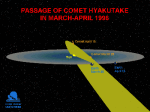 Comet Hyakutake's Orbit
Comet Hyakutake's Orbit
14.03.1996
Where did Comet Hyakutake come from? The orbits of the Earth and this brightening comet are shown in the above diagram. The blue disk is bounded by the circular orbit of the Earth about the central Sun. The comet's path outlines the green shape.
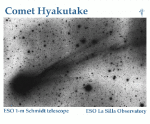 Here Comes Comet Hyakutake
Here Comes Comet Hyakutake
13.03.1996
The reaction of ancient peoples to the appearance of bright comets has toppled empires, de-throned kings, and been taken as a sign of great things to come. Probably some of these comets did not get as bright as Comet Hyakutake ("hyah-koo-tah-kay") will in the next two weeks.
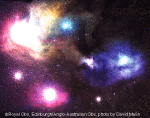 The Colorful Clouds of Rho Ophiuchi
The Colorful Clouds of Rho Ophiuchi
12.03.1996
The many spectacular colors of the Rho Ophiuchi (oh'-fee-yu-kee) clouds highlight the many processes that occur there. The blue regions shine primarily by reflected light. Blue light from the star rho Ophiuchi and nearby stars reflects more efficiently off this portion of the nebula than red light.
 Hubble Telescope Maps Pluto
Hubble Telescope Maps Pluto
11.03.1996
No spacecraft from Earth has yet explored Pluto but astronomers have found ways of mapping its surface. A stunning map of this distant, diminutive planet, the first based on direct images, was revealed late last week in a Hubble Space Telescope press release.
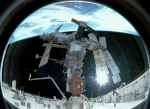 Mir is 10
Mir is 10
10.03.1996
The first module of the Russian Space Agency's Mir Space Station was launched into orbit 10 years ago (on February 20, 1986). Mir has since been substantially expanded in orbit by adding additional modules including the Kvant Astrophysics Module (1987) and recently a docking module.
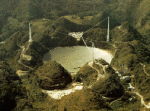 Arecibo: The Largest Telescope
Arecibo: The Largest Telescope
9.03.1996
The Arecibo radio telescope is currently the largest single-dish telescope in the world. First opening in 1963, this 305 meter (1000 foot) radio telescope resides in a natural valley of Puerto Rico. The Arecibo...
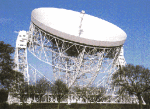 The 76 Meter Lovell Radio Telescope
The 76 Meter Lovell Radio Telescope
8.03.1996
Jodrell Bank in England is the home of the Lovell Telescope one of the largest radio telescopes in the world. Completed in 1957 under the direction of Bernard Lovell, the 250 ft. diameter dish was the largest steerable radio telescope.
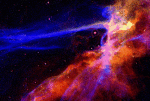 Rampaging Fronts of the Veil Nebula
Rampaging Fronts of the Veil Nebula
7.03.1996
A supernova explosion of a high-mass star results in fast moving blast waves. At the front of the waves shown above, ionized gas in the Veil Supernova Remnant rushes out from the explosion, sweeps up material, and breaks up many atoms into constituent ions and electrons.
 Jets From SS433
Jets From SS433
6.03.1996
SS433 is one of the most exotic star systems known to astronomers. Its unremarkable name stems from its inclusion in a catalog of stars which emit radiation characteristic of atomic hydrogen. Its very remarkable behavior stems from a compact object, a black hole or neutron star, which has produced an accretion disk with jets.
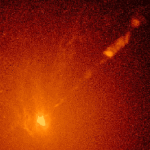 A Black Hole in M87's Center?
A Black Hole in M87's Center?
5.03.1996
The center of nearby giant galaxy M87 is a dense and violent place. In this 1994 photograph by the Hubble Space Telescope, a disk of hot gas was found to be orbiting at the center of this massive elliptical galaxy. The disk is evident on the lower left of the above photograph.
|
January February March April May June July August September October November |
|||||||||||||||||||||||||||||||||||||||||||||||||